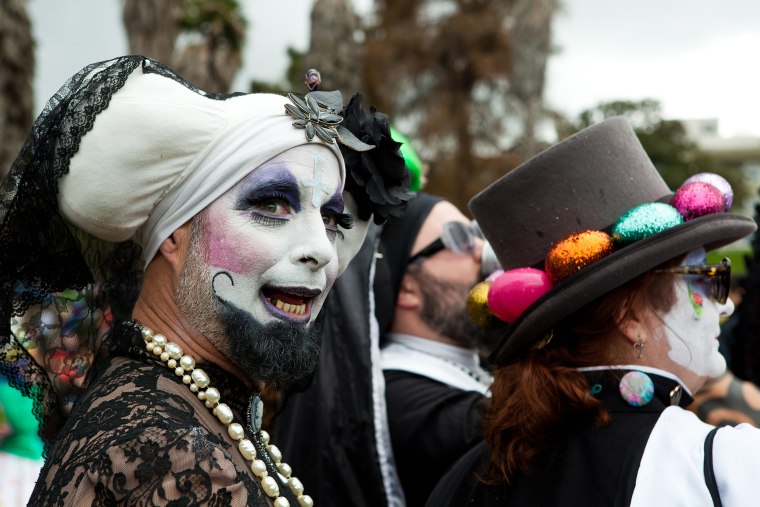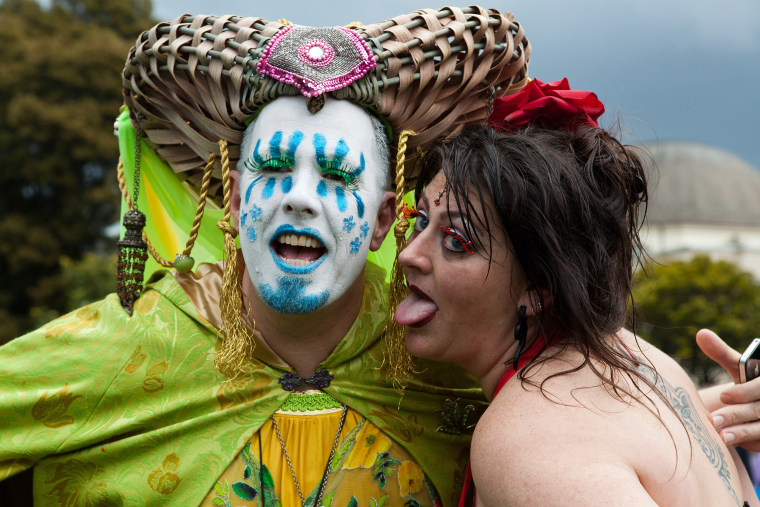The Sisters of Perpetual Indulgence Mark 40 Years of ‘Dragtivism’
According to Michael Williams, much better known as “Sister Roma,” the story of the Sisters of Perpetual Indulgence began in San Francisco on Easter Day of 1979. Back then, just a year before the city’s gay community was struck by the AIDS epidemic, four friends found themselves fed up with what Roma called the “Castro clone look.”
“Gay men in San Francisco in the 70s all presented very masculine, leather jackets, moustaches, sort of like the Marlboro Man, you know?” Roma told NBC News. “So they were very fed up with that, and they thought, ‘Let’s put on these nun’s habits and sort of go out and screw with people and see what happens.’”
As they strolled from the Castro to the city’s gay beach, Roma said, “everywhere they went the reaction was just insane — people had never seen anything like men, most of them with facial hair, in nun’s habits.” They realized they were onto something, so they came up with a name for their group: The Sisters of Perpetual Indulgence.
Now four decades later, The Sisters of Perpetual Indulgence were clearly ahead of their time, and many of their campy “dragtivism” tactics have inspired others, Roma said. “Little did they know it, but these four queers who went out in these nuns habits actually changed the world,” she said.
“One of the original sisters was Bobbi Campbell, who was Sister Florence Nightmare, who was a registered nurse,” Roma said.
Campbell became well known across America as the self-designated “AIDS poster boy,” a role he took on in an effort to destigmatize the disease.
“The sisters took a very pragmatic, responsible attitude towards the virus, and said, ‘We need to protect the community,’” Roma said. “So the sisters produced a safer sex pamphlet called Play Fair that we still produce today, that was the world’s first-ever safer sex pamphlet.”
In the early 1980s, The Sisters of Perpetual Indulgence hosted some of the world’s first fundraisers for AIDS victims, many of whom faced financial ruin as the then-unknown pathogen ravaged their bodies. “The sisters were at the forefront of the fight against HIV/AIDS before anyone knew what the disease was,” Roma said.

At each anniversary every 10 years, the sisters have had a different focus. In 1989, Roma launched the “stop the violence” campaign, which addressed an uptick of homophobic hate crimes in San Francisco at that time.
“In 1989, queer people were still really fighting for equality and just desiring to be recognized as equal people in the world,” Roma said. “So it was a very basic fight, and we were also crippled with HIV and AIDS, which many people saw as a disease that was killing all the right people.” That year, The Sisters of Perpetual Indulgence also became an official nonprofit organization.
For their 20th anniversary in 1999, the Sisters closed Castro Street for a massive celebration. “That seemed like a no-brainer to us, but apparently it was quite a major issue for a lot of people in San Francisco, who still at the time … thought that we were very sacrilegious,” Roma said. But support from local politicians got them through the day, and they hosted their street fair, where the Sisters emceed a “hunky Jesus” competition that continues to this day.

Because of publicity generated by the opposition, “it was one of the largest celebrations that we had, probably ever in our history,” with around 20,000 to 30,000 people filling Castro street, Roma said.